Since bulimia doesn’t necessarily cause weight loss, separating someone with an eating disorder from a healthy person can be tricky. And the longer the eating disorder lasts, the harder it can be to treat.
These are five important bulimia facts everyone should know.
Fact 1: Bulimia is Common
Few people with bulimia talk openly about how they feel, think, and cope with their eating disorder. But chances are, you know someone who has bulimia now or who is in recovery.
Researchers say about 1.5% of women and 0.5% of men have bulimia at some point during their lifetime. [1] This figure could be missing many people.
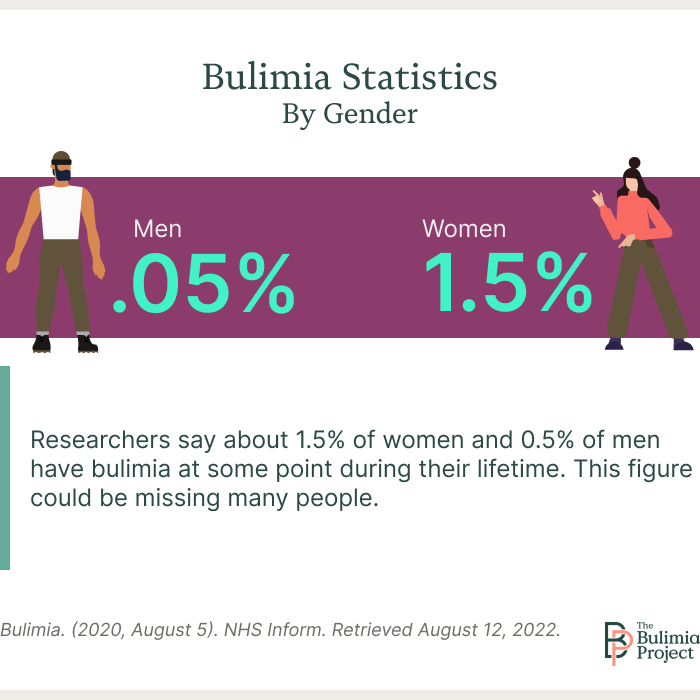
Doctors use formal, technical documents to determine who has bulimia. People who don’t meet all the criteria may never be formally diagnosed with the eating disorder. But meanwhile, they struggle to control their thoughts, feelings, and behaviors. And some people struggle in silence without telling anyone about their symptoms.
Bulimia can also touch people differently. For example, black teenagers are 50% more likely to have bulimia than their white counterparts. [2] And some people who must watch their diet carefully (like people with diabetes) face an increased risk of bulimia too.
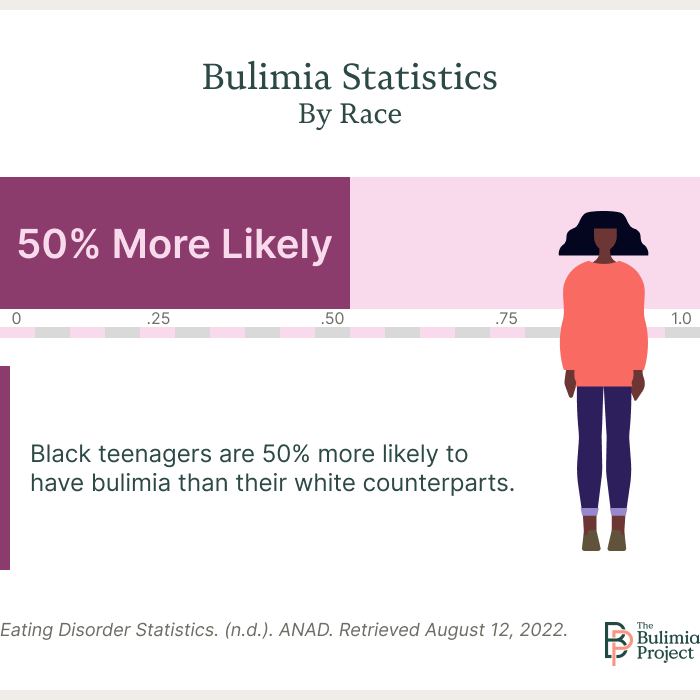
Remember that it’s almost impossible to spot someone with bulimia by sight. Less than 6% of people with eating disorders are underweight. [2] Most people are at a healthy weight or a little overweight. If you don’t talk with someone about a potential eating disorder because they’re not thin, you could miss an opportunity to help.
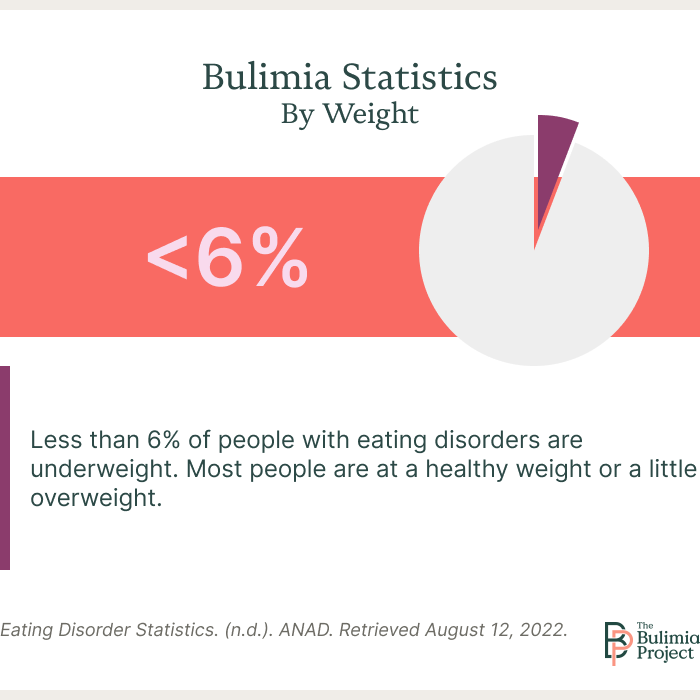
Fact 2: Bulimia is a Mental Illness
Some people believe that people with bulimia choose unusual methods to lose weight. They don’t have a mental illness, the argument goes. They just need to find a more efficient way to diet.
In reality, bulimia is a mental illness characterized by extreme suffering and distorted thinking.
A typical thought pattern looks like this:
- “I am fat.” The person feels uncomfortable with their weight or body shape, and extreme diets seem like the solution. But unfortunately, hunger begins to grow, and stress builds when they don’t lose weight.
- “I am so upset.” Negative emotions rise, and bingeing on food seems like a way to stop thinking.
- “I am disgusting and still fat.” The person purges the food consumed in the binge.
For many people with bulimia, this becomes a repeating cycle. [3] Every day, this person’s thoughts and feelings are centered on bulimia.
Bulimia also causes distorted thinking. Despite being healthy or even underweight, people with bulimia believe they are large and should diet. [4] This persistent thought drives the eating disorder.
Bulimia causes such intense mental distress that some people feel life isn’t worth living. About 26% of people with eating disorders attempt suicide. [2]
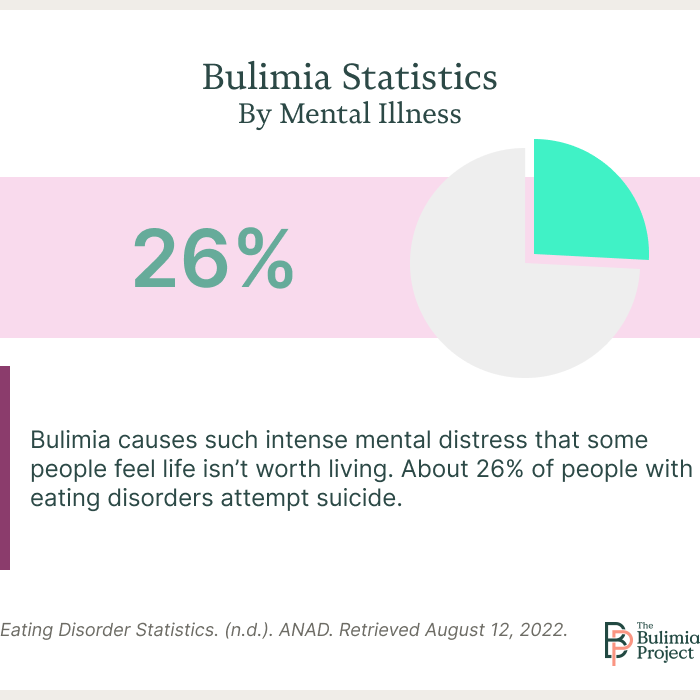
Fact 3: Bulimia is Deadly
Anorexia is often called the “deadliest eating disorder.” While this might be true, far too many people die of bulimia.
Researchers say that about 4% of people with anorexia die due to the disease, and 3.9% of people with bulimia die. [5] This half of a percentage point proves that bulimia is a very serious issue.
More than 90% of people with bulimia use vomiting or laxatives.
Bulimia is characterized by bingeing and purging. More than 90% of people with bulimia use vomiting or laxatives to remove calories from their bodies. [6] These methods cause many of the health consequences tied to bulimia.
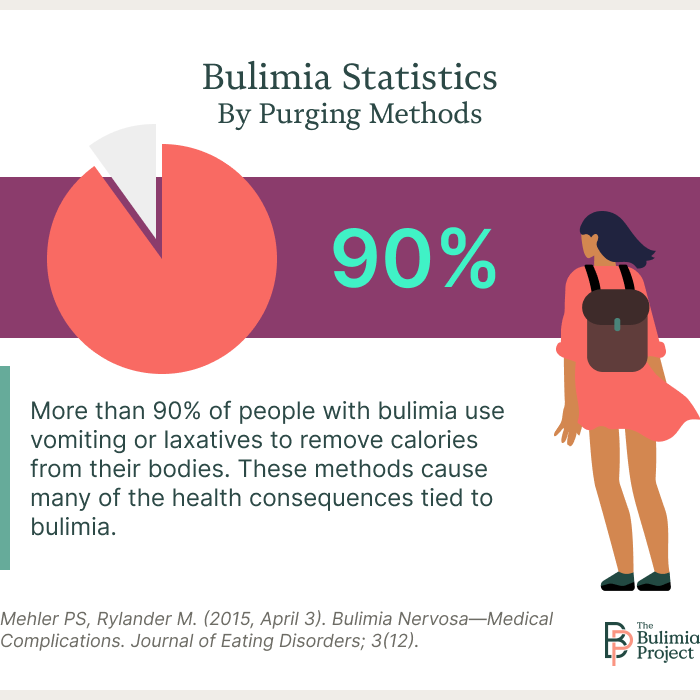
People with bulimia can develop the following: [7]
- Gastrointestinal problems
- Dehydration
- Dental disease
- Malnutrition
People with bulimia can also develop heart failure. Vomiting puts intense pressure and strain on the body, and a loss of electrolytes can keep the heart from beating on schedule. In addition, a poor diet and a lack of critical nutrients can quickly lead to heart disease and early death.
Fact 4: Bulimia Causes Are Varied
Some diseases are tied to simple, easy-to-understand problems. Bulimia is complex. Every person with this eating disorder likely has a personal and private reason for eating unusually.
Researchers say up to 74% of the risk of eating disorders is genetic. [2] People with parents who were bulimic can develop the condition too.
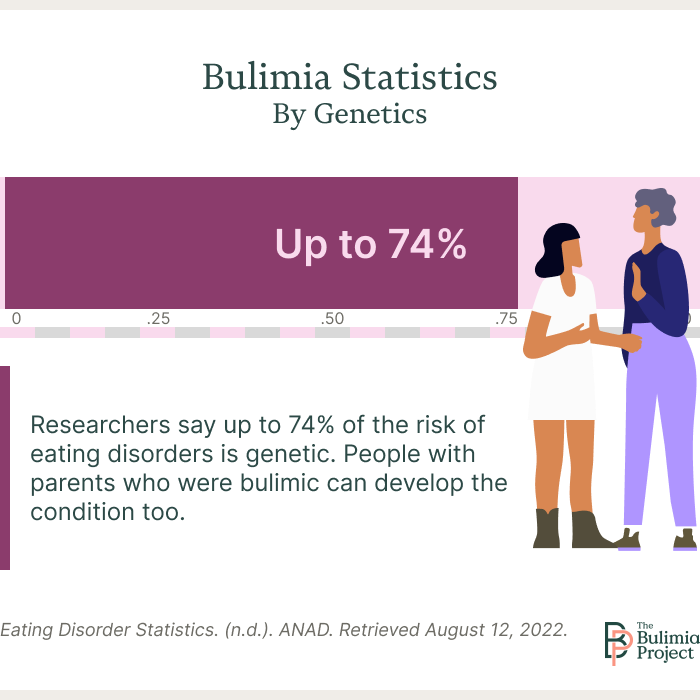
But answering the nature/nurture question isn’t easy. Children are deeply influenced by their parents, and they watch them closely. A child who hears her mother complain about weight and dieting may think this is just what adults do. As she grows, she mimics it.
Researchers also say that bulimia could be caused by psychological issues, including trauma and societal pressure. For many people, the exact cause of bulimia is impossible to pin down. [4]
Fact 5: Recovery is Possible
While bulimia is a complicated and dangerous mental illness, people with this eating disorder can get better. But it can take a long time to do so.
Researchers say close to 70% of people with bulimia fully recover, but it can take decades for them to achieve this recovery. [8]
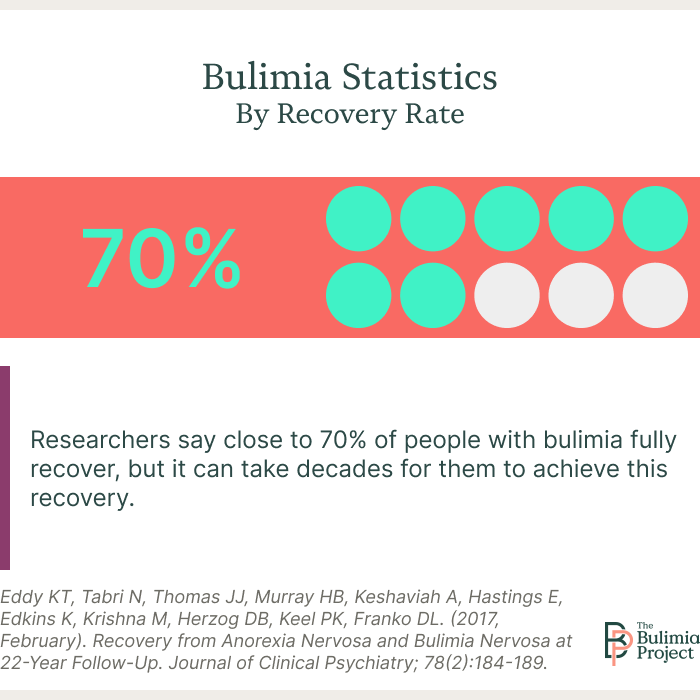
Bulimia treatment programs often involve the following:
- Medical support: When people enter treatment, they may have deep electrolyte imbalances and poor nutrition. They may also be resistant to eating a healthy diet, and they may need medications to help their hearts. Doctors, nurses, and nutritionists can help.
- Therapy. Cognitive behavioral therapy (CBT) and other forms of talk therapy can help people to understand their binge triggers. Instead of episodes seeming “out of the blue,” people can learn to spot the signs early and avoid overeating.
- Medication: Pharmaceutical therapies aim to correct imbalances and allow people to feel calm and focused. Medications can help people feel in control of their bodies and happier about their lives when paired with therapy.
Experts say people in recovery haven’t had an episode of bingeing or purging for a year or longer. [9] For many people with bulimia, that’s a hard number to reach.
Bulimia is characterized by relapse. People grow too confident, get pushed too hard, and make mistakes. However, a slip doesn’t mean a return to the full disorder.
People can return to therapy and gain a deeper understanding of what went wrong and what they can do better. With that knowledge, they can avoid the next slip.
A relapse doesn’t mean the person is a failure or won’t get better. It’s just part of the recovery process and is common in many mental illnesses.
How to Help Someone With Bulimia
You’ve read through these notes, and you recognize someone you love. What can you do next?
Bulimia and other eating disorders often cause denial. But you might be surprised by how your loved one reacts to a gentle conversation in which you express your support.
You don’t need to shame, blame, or scare them. But you can tell them how much you care about them and are concerned about their health and future.
Be Understanding and Supportive
Tell them what you’ve learned, and explain how you’ve seen similar behaviors in their life. Explain that treatment works and could make life better. Point out that you’ll go with them to treatment if they want you to do so.
People with bulimia need support while they fight back against their eating disorder. As a friend, you can drive them to appointments, listen to them discuss their feelings, and be a quiet source of support when they don’t want to talk. Stick with them, and your relationship will deepen as they get better.
Watching someone you love struggle with an eating disorder can be hard. But your kindness and compassion could make all the difference. Talk with them because your conversation could prompt them to get the help they need.
Resources
- Bulimia. (2020, August 5). NHS Inform. Retrieved August 12, 2022.
- Eating Disorder Statistics. (n.d.). ANAD. Retrieved August 12, 2022.
- Eating Disorders. (n.d.). National Alliance on Mental Illness. Retrieved August 12, 2022.
- Bulimia. (2022, March 1). U.S. Department of Health and Human Services. Retrieved August 12, 2022.
- Crow SJ, Peterson CB, Swanson SA, Raymond NC, Specker S, Eckert ED, Mitchell JE. (2009, December). Increased Mortality in Bulimia Nervosa and Other Eating Disorders. American Journal of Psychiatry; 166(12):1342-1346.
- Mehler PS, Rylander M. (2015, April 3). Bulimia Nervosa—Medical Complications. Journal of Eating Disorders; 3(12).
- Bulimia Nervosa. (2021, May). Health Direct. Retrieved August 12, 2022.
- Eddy KT, Tabri N, Thomas JJ, Murray HB, Keshaviah A, Hastings E, Edkins K, Krishna M, Herzog DB, Keel PK, Franko DL. (2017, February). Recovery from Anorexia Nervosa and Bulimia Nervosa at 22-Year Follow-Up. Journal of Clinical Psychiatry; 78(2):184-189.
- Given Time, Most Women with Anorexia or Bulimia Will Recover. (2016, December 20). Science Daily. Retrieved August 12, 2022.